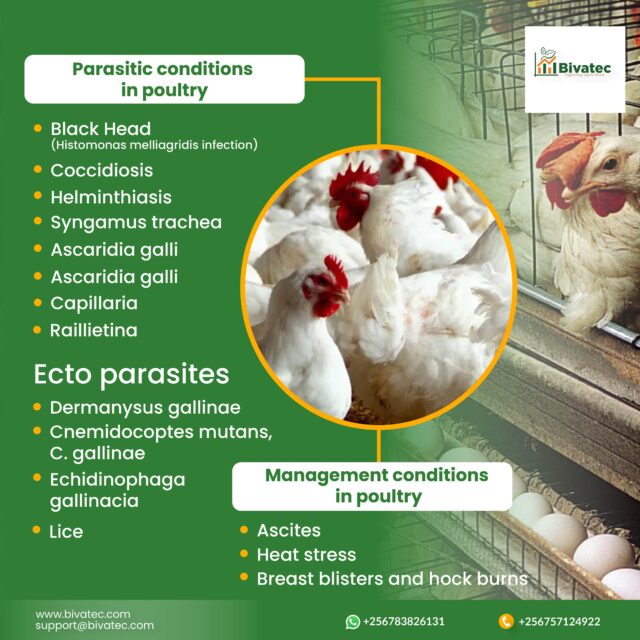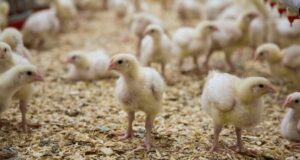
Managing the nutrition of broiler birds during the summer months is crucial for maintaining their health, growth rate, and productivity. High temperatures can stress birds, reduce feed intake, and impact their overall performance. Here’s a comprehensive guide to optimizing the nutrition and management of broiler birds during hot weather.
Heat stress in broiler birds can lead to:
- Reduced feed intake
- Decreased growth rates
- Lower feed conversion efficiency
- Increased mortality rates
- Elevated respiratory rates and panting
- Electrolyte imbalance
These challenges necessitate strategic nutritional adjustments to help birds cope with high temperatures.
Water Management:Water is vital for broiler birds, especially in summer, for maintaining hydration and regulating body temperature.
- Increase Water Availability: Ensure an uninterrupted supply of cool, clean water. Birds consume more water during hot weather.
- Electrolyte Solutions: Add electrolytes to the water to prevent dehydration and maintain osmotic balance. Common electrolytes include sodium, potassium, and bicarbonates.
- Regular Maintenance: Clean water lines and drinkers frequently to prevent microbial growth and ensure water quality.
Feed Formulation Adjustments:Adjusting the feed formulation to meet the birds’ nutritional needs during summer can help mitigate the effects of heat stress.
- Energy Levels: Use high-energy diets with reduced fiber content. High-fiber diets generate more metabolic heat, which can exacerbate heat stress.
- Protein and Amino Acids: Maintain adequate levels of essential amino acids. Consider using synthetic amino acids to meet requirements without increasing protein content, as protein metabolism generates heat.
- Fat Supplementation: Incorporate fats and oils as they are energy-dense and produce less metabolic heat compared to carbohydrates and proteins.
- Vitamins and Minerals: Increase levels of vitamins A, C, and E, which act as antioxidants and help reduce oxidative stress. Ensure adequate levels of minerals like zinc and selenium to support immune function and stress resilience.
- Feed Timing: Offer feed during the cooler parts of the day, such as early morning and late evening, to encourage intake when the birds are less heat-stressed.
Feed Presentation
- Pellet Quality: Use high-quality pellets to reduce feed wastage and improve feed intake. Pelleted feed also reduces the energy required for digestion compared to mash feed.
- Crumbles for Young Birds: For younger birds, crumbles can be more palatable and easier to consume, encouraging better feed intake.
Environmental Management
- Ventilation: Ensure proper ventilation in the poultry house to remove excess heat and humidity. Use fans, cooling pads, or misting systems to lower the ambient temperature.
- Insulation: Properly insulate the poultry house to prevent heat ingress and maintain a stable internal environment.
- Litter Management: Maintain dry litter to prevent the buildup of ammonia and reduce respiratory stress.
Dietary Additives:Several dietary additives can help broilers cope with heat stress.
- Antioxidants: Supplementing with antioxidants like vitamin E and selenium helps combat oxidative stress.
- Probiotics and Prebiotics: Enhance gut health and nutrient absorption.
- Betaine: Acts as an osmolyte and helps maintain cell integrity and function during heat stress.
- Electrolytes: Supplement with sodium bicarbonate, potassium chloride, and other electrolytes to maintain acid-base balance.
Monitoring and Evaluation
- Regular Weighing: Monitor bird weight regularly to assess growth rates and adjust nutrition accordingly.
- Feed Conversion Ratio (FCR): Track FCR to evaluate the efficiency of feed utilization.
- Health Checks: Conduct regular health checks to detect early signs of heat stress or nutritional deficiencies.
Contingency Planning
- Emergency Measures: Have a plan in place for extreme heat events, including additional cooling measures and emergency hydration solutions.
- Training Staff: Ensure staff are trained to recognize and respond to signs of heat stress in broilers.
Conclusion
Effective nutrition management for broiler birds during the summer months requires a multifaceted approach. By optimizing water availability, adjusting feed formulations, enhancing environmental conditions, and incorporating dietary additives, poultry producers can help mitigate the adverse effects of heat stress and ensure healthy, productive flocks. Regular monitoring and contingency planning are essential to adapt to changing conditions and maintain optimal bird performance.
















